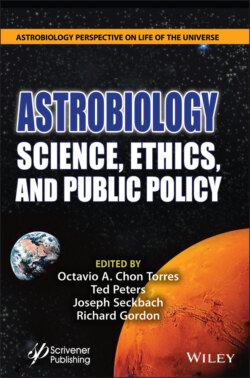Читать книгу Astrobiology - Группа авторов - Страница 27
2.2.2.2 Religious Reliance on the Common Good
ОглавлениеIn addition to hypothesizing that ethics is inherent within the scientific interpretation of nature, should the scientific enterprise allow itself to be painted with a religious brush? Do ethicists working within a specific religious orientation have any right to speak to the direction taken by science?
Durham University astrotheologian and astronomer David Wilkinson [2.92] relies on the hypothesis that science and its subject matter, the natural world, already emit moral valence. With the prospect of meeting extraterrestrial life on an exoplanet, Wilkinson reminds us that “theology will want to stress the importance of an ethical dimension in any contact with life-forms elsewhere in the Universe” [2.67]. Note that Wilkinson will not simply paint religious values over an otherwise value-free scientific discovery. Rather, as a theologian-scientist hybrid, he will recognize values as they arise from the new situation. It is inherent to the theological task to engage in ethical speculation and moral commitment and, in this case, theological speculation responds to what we will learn through science about the natural realm.
With such a theological perspective, a Christian moral posture would be erected on God’s plan for a promised new creation [2.67]. That new creation entails an important moral norm, namely, the “common good.” A middle axiom that connects God’s promised new creation to the present moment is our vision of the common good, symbolized biblically as the eschatological Kingdom of God.
Pope Paul VI defined the common good as “the sum of those conditions of social life which allow social groups and their individual members relatively thorough and ready access to their own fulfillment” [2.89]. Saint Pope John XXIII previously said clearly that “the attainment of the common good is the sole reason for the existence of civil authorities” [2.94]. The Lutherans have extended the common good to embrace all of life without directly specifying extraterrestrial life.
“Today, the meaning of ‘common good’ or ‘good of all’ must include the community of all living creatures. The meaning also should extend beyond the present to include consideration for the future of the web of life. The sphere of moral consideration is no longer limited to human beings alone” [2.29].
What the Holy See and the Lutherans make explicit is already implicit within naturally derived ethical insights, namely, the moral responsibility of governments and all persons of good will is to serve the common good.
Let me entertain two likely objections to this theological input into astroethics. First, one might object that this is only what Christians think. Christianity is only one religion among many; and adherents to other religious beliefs have their own ethical groundings and norms. To make matters more complicated, moral values are relative to one’s culture and context and personal preferences. A Christian has no right to superimpose sectarian morality on those who do not freely affirm the same basic commitment. To put it another way: the ethical ground on which a Christian stands is shifting sand for the non-Christian.
Let me respond. Christians live in neighborhoods with Muslims, Jews, Hindus, Buddhists, agnostics, and atheists, among others. Despite this diversity, however, we all live in a shared planetary community, or at least within a worldview that makes a shared planetary community plausible. At some level, shared ethical commitments and responsible moral behavior are indispensable for any communal cooperation in pursuit of the common good.
When it comes to space ethics, we must think of the entire human race on the third planet from the sun as a single community of moral deliberation. “The world common good demands the existence of a world community, a planetary public consisting of all those affected by the actions of others on earth,” writes Georgetown University political scientist, Victor Ferkiss [2.31]. What this implies is that public ethical reasoning—the ethical reasoning by Christian ethicists as well as ethicists coming from any other tradition—must be sufficiently transparent as to make sense for a collection of diverse perspectives while lifting up a vision of the common good. This is what I am attempting here, even if briefly.
A second objection might come from postcolonial or postmodern critics who decry the ideal of a single global community of moral deliberation. Why do they object? Because such an ideal of a universal humanity is a distinctively “modern” and, therefore, outdated idea. The problem is this: Such a global ethic would rely upon universal thin values apart from any tradition-specific thick values. The thick traditional practices of specific moral communities might become marginalized if we develop a single moral community and an astroethic based on the lowest common denominator. “Rather,” comments Kenyan theologian Gavin D’Costa, “I would suggest that it is important to allow different communities to advance their own thick descriptions, and then to work with what arises at that point” [2.23]. The assumption at work here is that thin values unite while thick values divide. Is this hopeless?
In response to D’Costa, I suggest that an Astroethics of Responsibility should enlist each existing tradition-rich moral community into a common planetary endeavor. This shared endeavor would then deal with a matter that concerns all earthlings equally, namely, our planet’s relation to what is beyond our planet. Given the existing competition between moral groups on Earth, and given the urgency of a unitary approach, perhaps a thin yet shared set of moral values would be the best we could practically ask for. A distinctively modern ethic that avoids top-down tyranny and encourages bottom-up participation would provide the requisite foundation for a planetary approach to space ethics [2.25].
